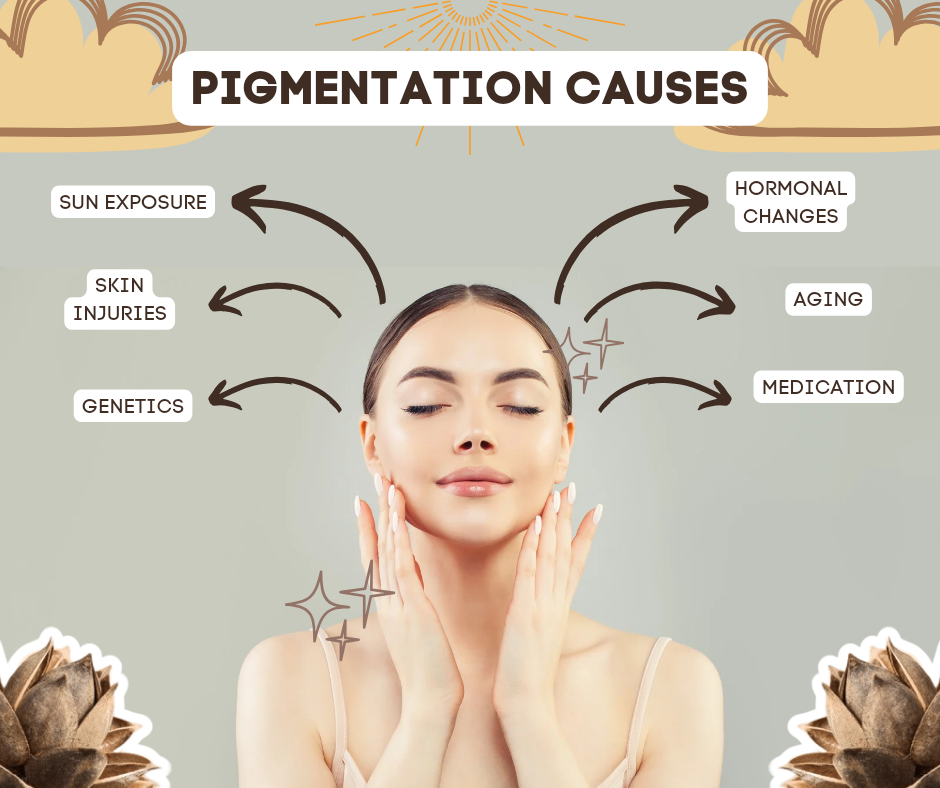Pigmentation concerns affect a vast number of individuals, leading to uneven skin tone, dark spots, and a lack of overall skin radiance. While pigmentation is a natural process, excessive pigmentation can stem from various factors such as sun exposure, hormonal changes, and skin injuries. Lets delve into the causes of pigmentation, the different types of pigmentation, and effective skincare strategies to manage and prevent pigmentation issues, empowering you to achieve a luminous complexion.
Understanding Pigmentation
Pigmentation is the natural colouring of the skin, determined by the production of melanin, a pigment produced by melanocyte cells. When melanocytes become overactive or damaged, they can produce excessive melanin, leading to pigmentation irregularities. The primary types of pigmentation disorders include:
1. Hyperpigmentation: This encompasses areas of the skin that are darker than the surrounding skin, including melasma, sun spots, and post-inflammatory hyperpigmentation caused by acne, injuries, or skin inflammation.
2. Hypopigmentation: This refers to the loss of skin colour, resulting in lighter patches of skin, as seen in conditions like vitiligo and albinism.
Causes of Pigmentation
Several factors can contribute to pigmentation irregularities, including:
1. Sun Exposure: UV radiation stimulates melanin production, leading to sun spots and uneven skin tone.
2. Hormonal Changes: Pregnancy, birth control pills, and hormonal fluctuations can trigger melasma, often referred to as "pregnancy mask."
3. Skin Injuries: Acne, cuts, or burns can lead to post-inflammatory hyperpigmentation.
4. Aging: As we age, our skin's ability to regulate melanin production decreases, leading to age spots and uneven pigmentation.
Skincare Strategies for Managing Pigmentation
1. Sun Protection: The most crucial step in managing pigmentation is sun protection. Daily use of a broad-spectrum sunscreen with at least SPF 30 helps prevent UV-induced pigmentation.
2. Topical Treatments: Ingredients like hydroquinone, retinoids, vitamin C, niacinamide, and alpha hydroxy acids can help fade existing pigmentation and inhibit melanin production.
3. Professional Treatments: Procedures such as chemical peels, laser therapy, and microdermabrasion can help reduce pigmentation and improve skin tone when performed by a qualified skin consultant or skincare professional.
4. Gentle Skincare: Using gentle cleansers and avoiding harsh exfoliation can prevent further irritation and inflammation that may lead to post-inflammatory hyperpigmentation.
5. Consistent Skincare Routine: Consistency is key when managing pigmentation. Regular use of targeted skincare products and treatments can yield gradual improvements over time.
Pigmentation concerns can be a source of distress for many individuals, but with the right skincare approach, it is possible to manage and prevent further pigmentation irregularities. Understanding the causes of pigmentation and implementing a comprehensive skincare routine that includes sun protection, targeted treatments, and gentle care can help achieve a more even, radiant complexion. Always consult with a skincare professional or dermatologist to develop a personalised plan that addresses your specific pigmentation concerns and unlocks the path to luminous, healthy skin.
For a free skin consultation please call us on 096308042

































































